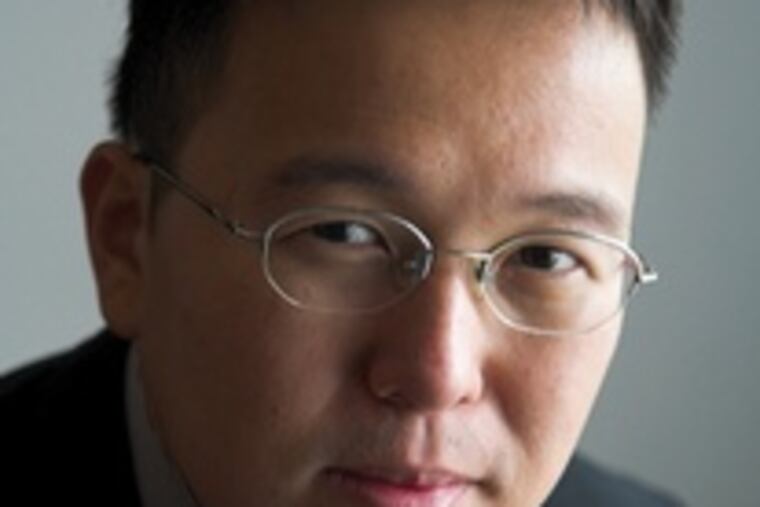The intricacies of love ensnarled by loyalty, war
A young man befriended by a Japanese diplomat tries to reconcile betrayal in the relationship.

By Tan Twan Eng
Weinstein Books.
448 pp. $23.95
Reviewed by Frank Wilson
The Gift of Rain
, which was long-listed for last year's Booker Prize, is about love.
Not romance. Not sex. Love, pure and anything but simple. Beautifully written and deeply moving, Tan Twan Eng's debut novel is one of the best books I've ever read.
Philip Hutton is 16 when Hayato Endo, a Japanese diplomat, pays a visit to Istana, the Hutton family estate on the island of Penang, off the coast of what is now Malaysia. The Huttons are a wealthy British colonial family. Philip's father, brothers and sister are in England for the summer. Philip is the youngest child, by his father's second wife, who was Chinese. Philip has chosen to stay at home, because being of mixed race has not made visits to England pleasant for him. "I was a child born between two worlds, belonging to neither."
It is 1939.
The book opens when Philip, in his 70s, receives a visit from Michiko Murakami, who is about his own age. She has just received, 50 years after it was written, a letter from Endo. With the letter had come Endo's Nagamitsu sword, a companion to one he had given Philip. Michiko wants to know what became of the man both she and Philip loved - and who loved them.
This is, for Philip, "the moment I had been waiting for. Fifty years I had waited to tell my tale, as long as the time Endo-san's letter took to reach Michiko." Like the letter, "the life I had lived was folded, only a blank page exposed to the world, emptiness wrapped around the days of my life. . . . And so, for the first and last time, I gently unfolded my life. . . . "
Endo paid that initial visit to Istana in order to borrow a boat. He had rented an island from Philip's father and his boat had been washed away by the tide. Philip offers him his own boat, and in gratitude Endo invites him to come along and have dinner. When Philip tells him his name, Endo recognizes it as one he had seen carved in a rock on the island.
Philip spends the night on the island, and in the morning Endo introduces him to aikido. He invites Philip to become his pupil. This is an honor and a privilege. Acceptance involves total commitment and loyalty. Philip accepts. Over the next few weeks, student and teacher bond, as Endo has Philip show him around the Malayan peninsula. They visit the Huttons' summer residence, atop a mountain overlooking all of Penang Island. They visit Kuala Lumpur. Philip shows Endo the bicycle trails through the jungle. And all the while Endo takes photos.
It is a much-matured Philip his family encounters on their return. And things seem to be going well. Philip's Chinese aunt brings about a meeting between Philip and his Chinese grandfather, who had disowned Philip's mother for marrying his father. Philip forms a deep friendship with Kon, the son of a Chinese clan leader. Kon also is a student of aikido and his teacher and Endo are old friends.
By now, though, war has broken out, as Endo had told Philip it would. Endo also tells him that the Japanese will invade Malaya. One of Philip's brothers joins the Royal Navy. The other - along with his sister's fiancé - is interned by the invaders. His sister disguises herself as a young man by cutting her hair. His father is forced to run his company for the Japanese. And Philip? He becomes the assistant to the Japanese second-in-command: Hayato Endo. But soon he is also passing along what he learns to Kon's guerrillas.
Teacher and student turn out to have roles that mirror each other. Just as Philip has agreed to work with the occupying force in order to win some measure of security for his family, so Endo is there because his father had opposed Japan's militarist faction. He had been banished from the court and imprisoned. Endo accepted his assignment in order to ensure that his father, now ill, would receive proper medical care. Michiko is the girl he left behind.
Tan Twan Eng's debut is a grand old-fashioned novel, intricately plotted, filled with incident and vivid, fascinating characters - to say nothing of genuinely hateful villains. The Japanese military does not come off well.
The quiet and unnoticed heroism of those who try their best to do their duty under the worst of circumstances brings to mind the novels of Joseph Conrad, but
The Gift of Rain
has a religious dimension that Conrad lacks. Elements of Buddhism and Taoism are so marvelously integrated into the story that you have no trouble suspending disbelief about reincarnation and soothsayers and ghosts.
But it is the agony of the love that Philip and Endo have for each other - and have always had, as it happens - that gives the book its soul: "I could feel no trace of anger towards him," Philip confesses, "only despair. It felt almost as though I had been expecting it. He had betrayed my innocence, but at the same time had replaced it with knowledge and strength and love."
Anyone who thinks the novel is in decline should read this one.